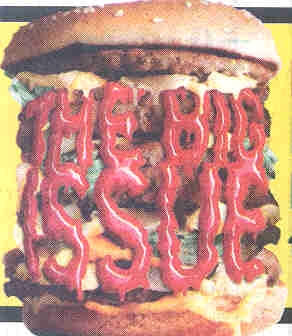
He has been in the news about using legal action against the problem of obesity in some of the same ways he pioneered in its use against the problem of smoking, see http://ash.org
He summarized his views on this topic (with more links) here
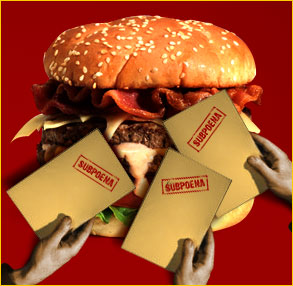
 |
John F. Banzhaf III is a
nationally-known professor and practitioner of public
interest law, see http://banzhaf.net
He has been in the news about using legal action against the problem of obesity in some of the same ways he pioneered in its use against the problem of smoking, see http://ash.org He summarized his views on this topic (with more links) here |
 |
| Seattle
School Board Under Fire Over Contract to Peddle
Coke for Kickbacks: CNN,
S.PI, S.PI 2, 2
Ltrs, FTimes, STimes,
WTimes, Editorials: One,
Two Addiction Letter Sent to Major Fast Food Giants: Daily Telegraph, CNN, CNNfn, Today Show, AP, Letter 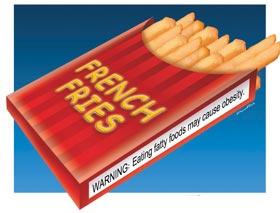 Restaurants Put on Notice Of Potential Addictive Effects of Foods At Major Food Policy Conf. Telegraph UPI Am. Med News Rest. News CNBC Chicago Trib |
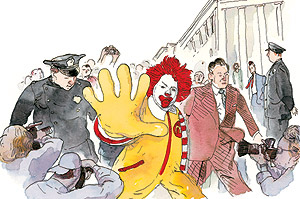 TIME: Novel legal theories revive the case against McDonald's — and spur other big food firms to slim down their menus Ice Cream Cos Threatened Read Recent Releases Banzhaf's Novel Law Class Coke Nixes Contracts Suits Not Frivolous: NYT |
Kraft and Other Big Food Companies Beginning
to Yield to Legal Threats: USA
Today, Chi.
ST, Miami
H, NY
Daily News, Good
Morning America Banzhaf Testimony Opposes Immunity: C-Span, SLTrib WashTimes, EconTimes, Testimony, Fox News, Today 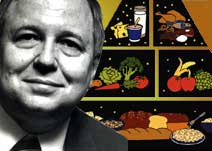 Law & Obesity Conference Effective: Wash Times, Wash Times II, Reuters, Article I, Reuters II , Article II Conf Info |
Fast food is addictive in the same way as drugs, say scientists, The Independent [1/31/03] Fast-food industry has a fat fight on its hands, Toronto Star1/29/03] Fat Suits Weighs In, Mac Headed Down Tobacco Road? National Law Journal 12/11/02] Crossfire, CNN [1/24/03] Food companies urged to act to deflect blame for the nation's increase in obesity, NY Times [12/4/02] Dan Abrams Report, MSNBC [1/21/03] Washington Times Editorial and response McDONALD'S WARNS CONSUMERS, DON'T EAT AT McDONALD'S MORE THAN ONCE A WEEK [ see ad ] McDonald's France Says Slow Down on the Fast Food, New York Times [10/30/02] MANY SUGGEST FOOD IS ADDICTIVE: Super-sized junk food addiction: Gotta have a Big Mac? Maybe you're going through withdrawal, Daily Telegraph [2/05/03] McDonald Law Suit Dismissal Only Temporary Judge Permits Amendment to Correct Problems,
and Offers Suggestions The judge who dismissed the law suit against McDonald's
acknowledged that the dismissal was only temporary, and was not based
upon any fundamental flaw in the legal theory. Jurors Will Hold Fast Food Companies
Liable for Obesity - Surveys Every Obese Person Costs Us $1500/yr Medical Costs Should Obese Pay Their Fair Share in Higher
Premiums? The obese have annual health care costs $1,500 higher
than similar people of healthy weight says a new study, raising the
issue of whether their health insurance premiums should be
correspondingly higher. LINKS AND OTHER RELATED INFORMATION: The following are links to other web sites and/or related information. Links to news reports are in the right column. For additional information about the class action law suit against McDonald's, check out this web site by the lawyer who brought the legal action: hbharti.com For more information about the law students who helped to bring about the class action law suit against McDonald's, and have subsequently formed a legal-action vegan organization [VLAN], see Vegetarian Legal Action Network OR VeggieFries To read an interesting judicial opinion in which a court upheld a complaint that ads for sugary cereals aimed at children were deceptive, click on : Comm. for Children's Television Inc. v. General Foods Corp., 673 P.2d 660 (1983) (Supreme Court of California) As of June 2000, 17 states — including California and New York — Chicago, and the District of Columbia already have special taxes on soft drinks or snack foods. link NEW CLASS-ACTION LAW SUIT FILED
AGAINST MAJOR FAST FOOD COMPANIES: GROUP FORMED TO PROMOTE LEGAL ACTIONS
AGAINST THE PROBLEM OF OBESITY: ADDITIONAL REFERENCES AND INFORMATION: Fast Food Nation, Book Review link Food For a Fat Nation, USA Today link Fighting Big Fat, Newsweek link |
McDonald’s to Offer Lower-Fat Fries [citing law suits], MSNBClink[09/03/02] Battle of the Widening Bulge, Eye on America, CBS-TV Evening News,[08/08/02]text AND VIDEO Fat Chance; Lawyers Want to Sue Food Industry for Making People Fat, CBS Sunday Morning [08/11/02] link First Cigarettes, Now Burgers, The Early Show, CBS-TV [07/15/02] link The Man Who Is Taking Fat to Court, Herald [7/14/02] link ["Banzhaf, it must be said, is far from your stereotypical litigation lawyer, forever looking out for an opportunity to screw a corporation or public institution and make a fast buck. Not only does he not make a cent from the suits that he inspires, he would, in fact, much rather not bring them in the first place. He would love it if the government would overhaul the food industry to make people healthier, just as he would have preferred the government to take action on smoking unprompted."] Is Big Food To Blame?, Ediet News [mailed to 10,000,000 subscribers] link["Posting the nutritional values in plain view. Issuing warning labels on fast food. Offering healthier alternatives to the traditional fatty fare. Banzhaf claims these are 'the profits' he hopes to earn through litigation. He tells eDiets he won't make a dime from the suits. And that's fine with him."] Tobacco wins set table for fast-food suits,Chicago Tribune [08/26/02] link Fast food on trial, NPR [08/08/02] link The scary fat end of the wedge: A US 'obesity bill' could make foodmakers liable for the health problems of overweight Americans, Financial Times of London [7/12/02] link Fat Nation Fights Back–Sort Of, U.S. News & World Report [07/01/02] link Fast Food Nation: An Appetite For Litigation, The US lawyer John Banzhaf was the first to sue the tobacco companies in the mid-Sixties. But now he wants to prosecute the junk-food industry for making Americans obese. The Independent (London) [06/04/02] link Junk Deal: Could Junk-Food Manufacturers Soon Be Facing Tobacco-Style Lawsuits? Some People Think It's Time, Men's Health Magazine [7-8/2002] p1 p2 p3 p4 p5 Image Can We Sue Our Own Fat Asses Off?, Food Companies Caving In - Tobacco Showed the Way The Times of London link Whose Fault Is Fat?: Experts Weigh Holding Food Companies Responsible for Obesity, abcnews.com [02/22/02] link Lawyers See Fat Payoffs in Junk Food Lawsuits, Fox News Channel [01/23/02] link Law Suit Against McDonald's, Canadian TV [2 minute news clip] [03/23/02] link Fatuous Response to Obesity. San Francisco Chronicle link Fast Food Industry Hit With Lawsuit, CROSSFIRE on CNN [09/02/02] link Professor Brings the Classroom to the Courtroom, The Hatchet [4/15/02] link Are Fast-Food Chains in Danger of Becoming the Targets of
Enormous Lawsuits, Just Like the Tobacco Industry, Fox News Videoclip [01/25/02] Hannity & Colmes Discuss Suits Against the Fast-Food Industry With Prof. John Banzhaf, Fox News Transcript [01/24/02] link Payback Time: The O'Reilly Factor Discusses the McDonald's Law Suit With Prof. John Banzhaf, Fox News Transcripts [01/29/02] link Is There a Fat Tax in Your Future?, Scripps Howard [04/30/02] link Legal Eagles Eye Fat of the Land , Courier Mail [07/03/02] link The Anti-Big Mac Attack, National Review [07/14/02] link THE INFLUENCE INDUSTRY: Slimming down - America Activists seek federal help to curb high obesity rates, The Hill [07/03/02] link Fast Food Industry Faces Lawsuits As Anger Grows Over Fat America, Scotland on Sunday [07/07/02] link Too Many Americans Are Obese, So Call In The Lawyers, La Repubblica.It EnglishItalian "Fat Fraud" Lawsuits Could Fatten Wallets, Professor sues McDonald's, [09/16/02] Hatchet McDonald's To Settle Suits on Beef Tallow in French Fries, New York Times [03/09/02] link In Bid to Improve Nutrition, Schools Expel Soda and Chips, New York Times [05/20/02] link Using Legal Action to Fight Obesity, Big Mac Legal Attack, The Connection, NPR (National Public Radio) link Moneyline on CNN [06/04/02] Transcript Big Food Fight, Insight cover [07/15/02] link Fast Food Law Suits, Abrams Report, MSNBC-TV [07/22/02] link Burger fans view lawsuit as bum steer, San Diego Union Tribune [08/04/02] link For Hindus and Vegetarians, Surprise in McDonald's Fries, New York Times [05/20/01] link Waistline Deadline, The Australian , [06/20/02] link Gefundenes Fressen: 30 Jahre lang hat John Banzhaf die
Tabakkonzerne bekriegt, um ihnen Milliardenentschädigungen
abzutrotzen. Nun hat der US-Rechtsprofessor die Fast-Food-Industrie im
Visier. DER SPIEGEL [06/10/02] link
Le fast-food au banc des accusés - Un chausson avec
ça? link
to original site, link to mirror
site, Chewing the Fat, New Republic, [06/17/02] link Food Makers Get Defensive About Gains in U.S. Obesity, Wall Street Journal [06/13/02] link McDonald's and Coke Fund Healthy-Eating Drive, The Guardian [06/14/02] link Oskarzony McDonald's przeprasza: Czy koncerny fast food zaplaca wysokie odszkodowania? link The Twinkie Offense [5/13/02] link Fast food - przysmak ryzykanta, forumonet.pllink Fat Chance: Food Cops and Closing in, link
Fat chance: food cops are closing in, Townhall.com [07/24/02] link 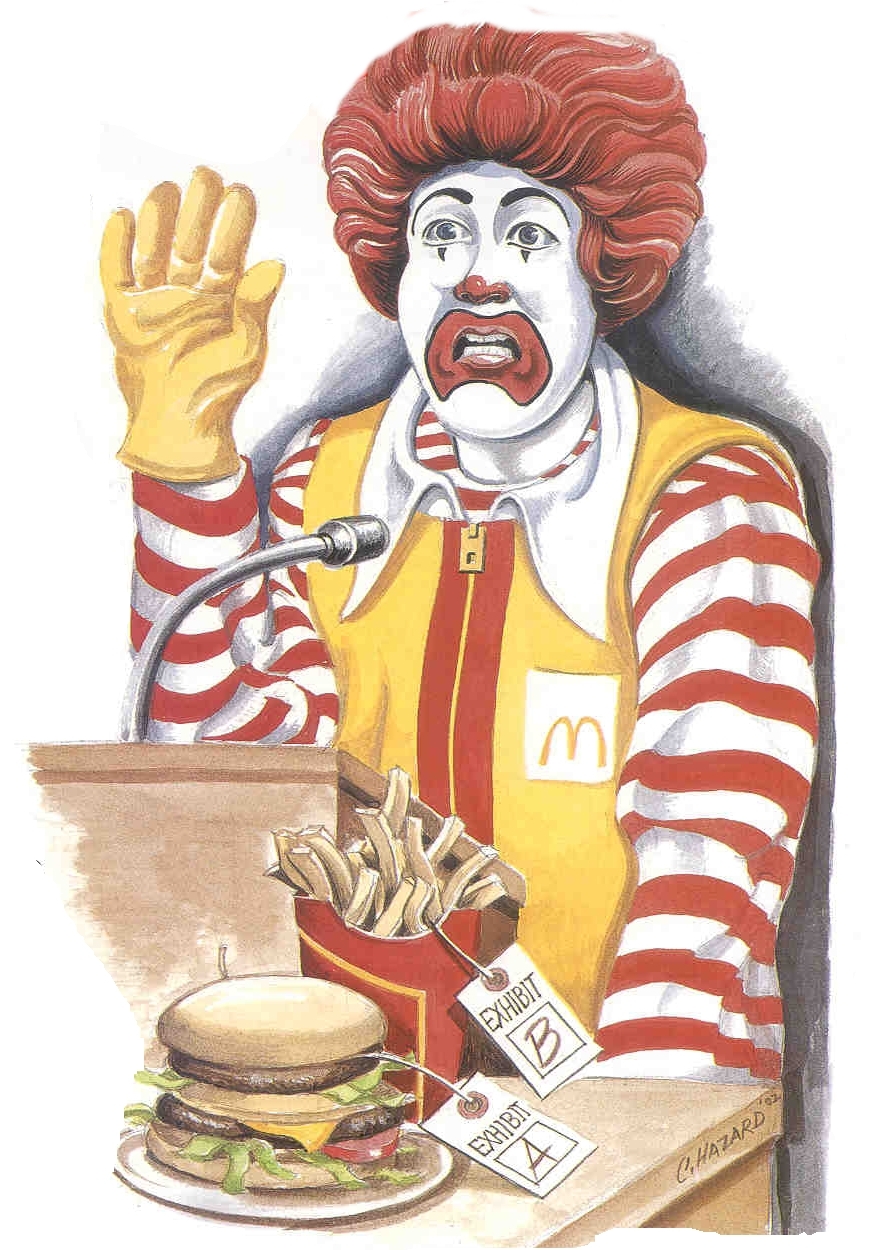 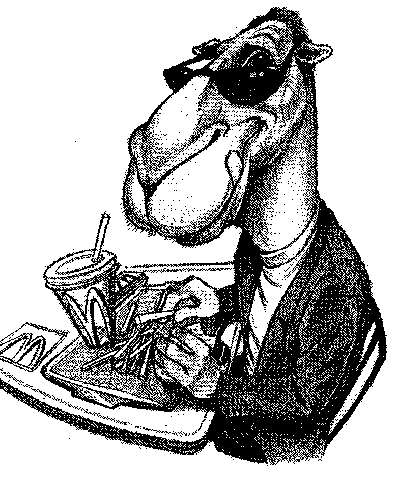
Fast Food Calorie and Fat Info. from the Washington Post Fast Food Calorie and Fat CHART Interactive Meal Planner - Calculate for Total Meal Fast Food Causes Great Bulk Of Obesity - Report Imposes Over $50 Billion/Year Costs on Taxpayers Law Suits Seek to Force Fast Food Outlets to Bear Their Share; Shifting These Costs to Outlets Would Also Deter Obesity Fast food companies are responsible for more than 65% of the rise in American obesity, and for more than $50 billion of the annual health care costs obesity imposes on taxpayers, according to a new study for the National Bureau of Economic Statistics. [SEE BELOW] This undercuts the arguments of the fast food giants who, in their defense of law suits seeking to hold them responsible for their share of the costs of obesity, claim that there are so many causes of the current epidemic that it would be impossible -- as well as unfair -- to blame them for any significant portion. "If fast food chains are the predominant cause of the current obesity epidemic, and contribute more to it than lack of exercise, web- and channel surfing, fattening foods eaten at home and at other restaurants, and all other causes COMBINED, it is only fair to hold them liable for their fair share, especially since that share can now be estimated," said law professor John Banzhaf. "For years tobacco companies argued that they shouldn't be held liable to smokers because there are many causes of lung cancer, but they lost on that issue when it became plain that smoking was the predominate cause, and therefore the most likely cause under the 'predominance of the evidence test'." Now that we can show that fast food restaurants are the predominant cause of obesity -- more responsible than all of the other causes combined -- the same result should occur, says Banzhaf, who masterminded the first successful fat suit against McDonald's, and is an advisor on two (including one by obese children) which are still pending. He also notes that, since obese people tend to eat at fast food restaurants more often than the average American, fast foods may be more than 70% or even 75% responsible for their weight problems. For example, the child plaintiffs in the pending law suit claim that they frequently ate at McDonald's many times a week. Forcing fast food restaurants to pay even 10% of the costs their products impose on innocent taxpayers -- over $5 billion a year -- would cause them to raise their prices, thereby discouraging the consumption of the major cause of obesity in the U.S., argues Banzhaf. from Belt-Loosening in the Work Force, New York Times [3/2/03] In analyzing the relationship of weight to incomes, food prices, restaurants, workforce participation and other variables, the economists concluded that the growth of fast food accounted for 68 percent of the rise in American obesity. See: An Economic Analysis of Adult Obesity 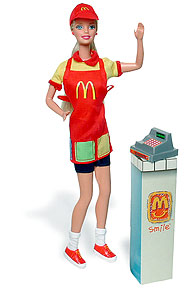 |